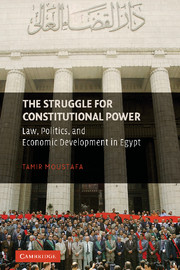Book contents
- Frontmatter
- Contents
- List of Figures and Tables
- Acknowledgments
- 1 Introduction: Law versus the State
- 2 The Politics of Domination: Law and Resistance in Authoritarian States
- 3 The Establishment of the Supreme Constitutional Court
- 4 The Emergence of Constitutional Power (1979–1990)
- 5 The Rapid Expansion of Constitutional Power (1991–1997)
- 6 Executive Retrenchment and an Uncertain Future (1998–2005)
- 7 Law, Development, and Democracy: A Critical Appraisal
- APPENDIX A SCC Justices and Commissioners
- APPENDIX B The Egyptian Constitution
- APPENDIX C Law 48 of 1979 Governing the Operations of the Supreme Constitutional Court of Egypt
- APPENDIX D Figures on Supreme Constitutional Court Rulings
- Bibliography
- Index
2 - The Politics of Domination: Law and Resistance in Authoritarian States
Published online by Cambridge University Press: 27 July 2009
- Frontmatter
- Contents
- List of Figures and Tables
- Acknowledgments
- 1 Introduction: Law versus the State
- 2 The Politics of Domination: Law and Resistance in Authoritarian States
- 3 The Establishment of the Supreme Constitutional Court
- 4 The Emergence of Constitutional Power (1979–1990)
- 5 The Rapid Expansion of Constitutional Power (1991–1997)
- 6 Executive Retrenchment and an Uncertain Future (1998–2005)
- 7 Law, Development, and Democracy: A Critical Appraisal
- APPENDIX A SCC Justices and Commissioners
- APPENDIX B The Egyptian Constitution
- APPENDIX C Law 48 of 1979 Governing the Operations of the Supreme Constitutional Court of Egypt
- APPENDIX D Figures on Supreme Constitutional Court Rulings
- Bibliography
- Index
Summary
The thought of judicial institutions in authoritarian states typically conjures up the image of state security courts with no standards of due process, handpicked judges lacking any degree of independence, and little hope for any measure of justice. We picture the bright lights on the defendant during his interrogation, or the young man from the film Midnight Express who is held in a Turkish prison without recourse to the law. In the academic literature, too, there is a strong assumption that authoritarian regimes either have no use for law and legal institutions or that law is applied instrumentally with courts acting as faithful agents of the regime. These assumptions are reflected in and reinforced by the new wave of comparative law scholarship that is focused almost exclusively on judicial politics in democratic or democratizing states.
This chapter challenges the conventional wisdom that democracy is a necessary prerequisite for a judicialization of politics. The Egyptian case and comparisons with Brazil (1964–1985), Chile (1973–1990), China (1990–present), Indonesia (1986–1998), Mexico (1926–2000), the Philippines (1972–1986), Franco's Spain (1936–1975), and other countries illustrate why and how regimes use courts to institutionalize their rule. The cases highlight a series of pathologies common to many authoritarian states that courts are often deployed to ameliorate. In some cases, courts were empowered to encourage investment. In others, they were created to strengthen administrative discipline within the state's own bureaucratic machinery. Still other regimes designed courts to arbitrate between factions within the ruling coalition.
- Type
- Chapter
- Information
- The Struggle for Constitutional PowerLaw, Politics, and Economic Development in Egypt, pp. 19 - 56Publisher: Cambridge University PressPrint publication year: 2007



